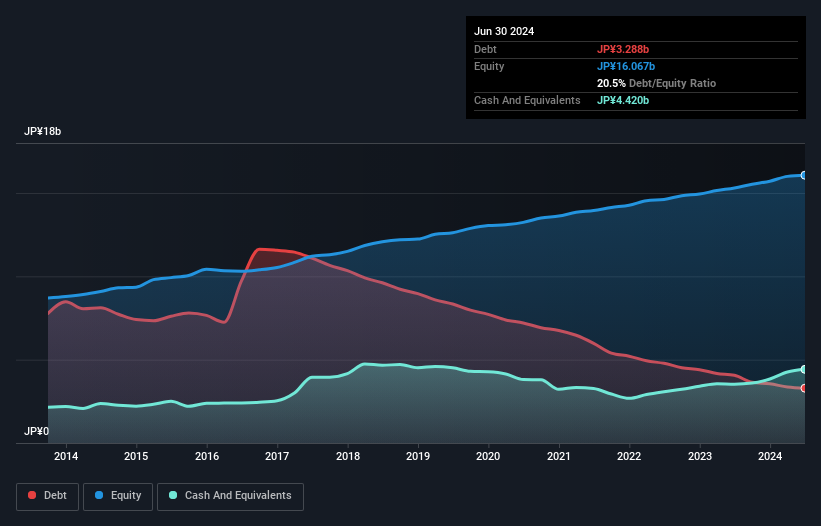David Iben put it well when he said, 'Volatility is not a risk we care about. What we care about is avoiding the permanent loss of capital.' So it seems the smart money knows that debt - which is usually involved in bankruptcies - is a very important factor, when you assess how risky a company is. We note that Sugimura Warehouse Co., Ltd. (TSE:9307) does have debt on its balance sheet. But should shareholders be worried about its use of debt?
When Is Debt Dangerous?
Generally speaking, debt only becomes a real problem when a company can't easily pay it off, either by raising capital or with its own cash flow. If things get really bad, the lenders can take control of the business. However, a more frequent (but still costly) occurrence is where a company must issue shares at bargain-basement prices, permanently diluting shareholders, just to shore up its balance sheet. Of course, debt can be an important tool in businesses, particularly capital heavy businesses. The first step when considering a company's debt levels is to consider its cash and debt together.
Check out our latest analysis for Sugimura Warehouse
What Is Sugimura Warehouse's Net Debt?
The image below, which you can click on for greater detail, shows that Sugimura Warehouse had debt of JP¥3.29b at the end of June 2024, a reduction from JP¥4.06b over a year. However, it does have JP¥4.42b in cash offsetting this, leading to net cash of JP¥1.13b.

A Look At Sugimura Warehouse's Liabilities
The latest balance sheet data shows that Sugimura Warehouse had liabilities of JP¥1.77b due within a year, and liabilities of JP¥4.10b falling due after that. Offsetting this, it had JP¥4.42b in cash and JP¥3.57b in receivables that were due within 12 months. So it actually has JP¥2.12b more liquid assets than total liabilities.
This surplus suggests that Sugimura Warehouse is using debt in a way that is appears to be both safe and conservative. Due to its strong net asset position, it is not likely to face issues with its lenders. Simply put, the fact that Sugimura Warehouse has more cash than debt is arguably a good indication that it can manage its debt safely.
Also good is that Sugimura Warehouse grew its EBIT at 17% over the last year, further increasing its ability to manage debt. The balance sheet is clearly the area to focus on when you are analysing debt. But you can't view debt in total isolation; since Sugimura Warehouse will need earnings to service that debt. So if you're keen to discover more about its earnings, it might be worth checking out this graph of its long term earnings trend.
Finally, a company can only pay off debt with cold hard cash, not accounting profits. Sugimura Warehouse may have net cash on the balance sheet, but it is still interesting to look at how well the business converts its earnings before interest and tax (EBIT) to free cash flow, because that will influence both its need for, and its capacity to manage debt. Happily for any shareholders, Sugimura Warehouse actually produced more free cash flow than EBIT over the last three years. That sort of strong cash conversion gets us as excited as the crowd when the beat drops at a Daft Punk concert.
Summing Up
While we empathize with investors who find debt concerning, you should keep in mind that Sugimura Warehouse has net cash of JP¥1.13b, as well as more liquid assets than liabilities. The cherry on top was that in converted 122% of that EBIT to free cash flow, bringing in JP¥1.7b. So is Sugimura Warehouse's debt a risk? It doesn't seem so to us. There's no doubt that we learn most about debt from the balance sheet. But ultimately, every company can contain risks that exist outside of the balance sheet. Case in point: We've spotted 2 warning signs for Sugimura Warehouse you should be aware of, and 1 of them doesn't sit too well with us.
If you're interested in investing in businesses that can grow profits without the burden of debt, then check out this free list of growing businesses that have net cash on the balance sheet.
New: Manage All Your Stock Portfolios in One Place
We've created the ultimate portfolio companion for stock investors, and it's free.
• Connect an unlimited number of Portfolios and see your total in one currency
• Be alerted to new Warning Signs or Risks via email or mobile
• Track the Fair Value of your stocks
Have feedback on this article? Concerned about the content? Get in touch with us directly. Alternatively, email editorial-team (at) simplywallst.com.
This article by Simply Wall St is general in nature. We provide commentary based on historical data and analyst forecasts only using an unbiased methodology and our articles are not intended to be financial advice. It does not constitute a recommendation to buy or sell any stock, and does not take account of your objectives, or your financial situation. We aim to bring you long-term focused analysis driven by fundamental data. Note that our analysis may not factor in the latest price-sensitive company announcements or qualitative material. Simply Wall St has no position in any stocks mentioned.
About TSE:9307
Sugimura Warehouse
Engages in the warehousing, customs clearance, port transport and freight forwarding, and real estate rental businesses in Japan.
Flawless balance sheet second-rate dividend payer.
Market Insights
Community Narratives




